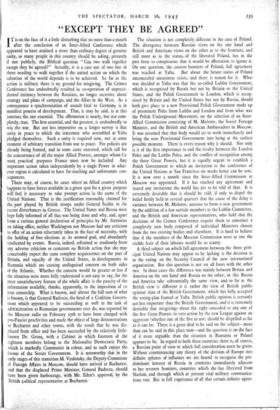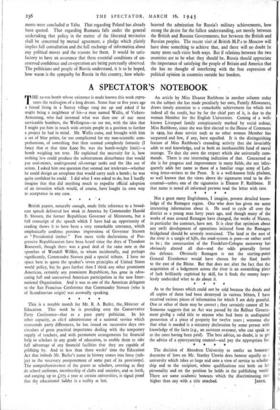"EXCEPT THEY BE AGREED"
1 I T is on the face of it a little disturbing that no more than a month after the conclusion of an Inter-Allied Conference which appeared to have attained a more than ordinary degree of genuine unity, so many people in this country should be asking, privately if not publicly, the Biblical question "Can two walk together except they be agreed?" Actually, it is a case not of two but of three needing to walk together if the united action on which the salvation of the world depends is to be achieved. So far as the action is military there is no ground for misgiving. The Crimea Conference has undoubtedly. resulted in co-operation of unpreCe7. dented intimacy between the Russians, no longer secretive about strategy and plans of campaign, and the Allies in the West. As a consequence a synchronisation of assault fatal to Germany is in manifest process of development. That, it may be said, is at this juncture the one essential. The affirmation is nearly, but not com- pletely, true. The first essential, and the greatest, is undoubtedly to win the war. But not less imperative on a longer survey is that unity in peace to which the statesmen who assembled at Yalta pledged themselves. Such a unity is required now, not at some moment of arbitrary transition from war to peace. For policies are already being framed, and in some cases executed, which call for the concurrence of all the major Allied Powers; amongst whom for most practical purposes France must now be included. Any important action taken independently by a single Power in what- ever region is calculated to have far-reaching and unfortunate con- sequences.
There may, of course, be cases where an Allied country which happens to have forces available in a given spot for a given purpose will feel it necessary to take prompt action in the name of the United Nations. That is the justification reasonably claimed for the part played by British troops under General Scobie in the recent disturbances in Greece. The United States and Russia were kept fully informed of all that was being done and why, and, apart from a- curious general declaration of principles by Mr. Stettinius on taking office, neither Washington nor Moscow had any criticism to offer of an action reluctantly taken in the face of necessity, with the holding of free elections as its avowed goal, and abundantly vindicated by events. Russia, indeed, refrained so studiously from any adverse criticism or comment on British action that she may conceivably expect the same complete acquiescence on the part of Britain, and equally of the United States, in developments in Rumania which are causing undisguised concern on both sides of the Atlantic. Whether the concern would be greater or less if the situation were more fully understood is not easy to say, for the most unsatisfactory feature of the whole affair is the paucity of the information available, thanks, apparently, to the imposition of zn iron censorship. What is known, and almost the full sum of what is known, is that General Radescu, the head of a Coalition Govern- ment which appeared to be succeeding as well in the task of administration as Rumanian governments ever do, was reported by the Moscow radio on February 25th to have been charged with pro-Fascist proclivities and made the.object of large demonstrations in Bucharest and other towns, with the result that he was dis- placed from office and has been succeeded by the relatively little- known Dr. Groza, with a Cabinet in which fourteen of the eighteen members belong to the Nationalist Democratic Party, which is markedly Communist in colour, and as such enjoys the favour of the Soviet Government. It is noteworthy that in the early stages of this transition M. Vyshinsky, the Deputy-Commissar of Foreign Affairs. in Moscow, should have arrived at Bucharest, and that the displaced Prime Minister, General Radescu, should have been given harbourage, with Mr. Eden's approval, by the British political representative at Bucharest. The situation is not completely different in the case of Poland. The divergence between Russian views on the one hand and British and American views on the other as to the frontiers, and still more as to the status, of the liberated Poland, has in the past been so conspicuous that it would be affectation to ignore it. On one question, the eastern frontiers of Poland, full agreement was reached at Yalta. But about the future status of Poland unconcealed uneasiness exists, and there is reason for it. What was decided at Yalta was that the so-called Lublin Government, which is recognised by Russia but not by Britain or the United States, and the Polish Government in London, which is recog- nised by Britain and the United States but not by Russia, should both give place to a new Provisional Polish Government made up of prominent Poles from Lublin and London and from what was the Polish Underground Movement, on the selection of an Inter- Allied Commission consisting of M. Molotov, the Soviet Foreign Minister, and the British and American Ambassadors in Moscow. It was assumed that that body would set to work immediately and bring the new Provisional Government into being at the earliest possible moment. There is every reason why it should. Not only is it of the first importance to end the rivalry between the London Poles and the Lublin Poles, and the conflict of recognition among the three Great Powers, but it is equally urgent to establish a Polish Government to which an invitation to the conference of the United Nations at San Francisco six weeks hence can be sent. It is now over a month since the Inter-Allied Commission at Moscow was appointed. If it has reached any agreement and issued any invitations the world has yet to be told of that. It is extremely desirable that it should be told, if only to dispel the belief firmly held in several quarters that the cause of the delay is variance between M. Molotov, anxious to form a new government by the addition of a few out-side members to the Lublin Committee, and the British and American representatives, who hold that the decisions of the Crimea Conference require them to construct a completely new body composed of individual Ministers chosen from the two existing bodies and elsewhere. It is hard to believe that if the members of the Moscow Commission were at one the visible fruit of their labours would be so scanty.
A third subject on which full agreement between the three prin- cipal United Nations may appear to be lacking is the decision as to the voting on the Security Council of the new international organisation. But this question is not on all fours with the other two. In those cases the difference was mainly between Britain and America on the one hand and Russia on the other; in this Russia and America take substantially the same view, and so far as the British view is different it is rather the view of British public opinion than of the British Government, which has fully accepted the voting-plan framed at Yalta. British public opinion is certainly not less important than the British Government, and it is extremely desirable that misgivings about the right conceded to any one of the five Great Powers to veto action by the new League against an aggressor (whether one of the five or not) should be dispelled so far as it can be. There is a great deal to be said on the subject—more than can be said in this place now—and the question is on the face of it more arguable than the situation in Rumania or Poland appears to be. In regard to both these countries there is, of course, a Russian point of view to which full consideration must be given. Without countenancing any theory of the division of Europe into definite spheres of influence we are bound to recognise the pre- dominant interest of Russia in countries immediately adjacent to her western frontiers, countries which she has liberated from Nazism, and through which at present vital military communica- tions run. But in full cognisance of all that certain definite agree- ments were concluded at Yalta. That regarding Poland has already been quoted. That regarding Rumania falls under the general undertaking that policy in the matter of the liberated territories shall be concerted by mutual agreement, a pledge which plainly implies full consultation and the full exchange of information about any political moves and the reasons for them. It would be satis- factory to have an assurance that these essential conditions of un- reserved confidence and co-operation are being punctually observed. The politicians and people of Russia understand, it is to be hoped, how warm is the sympathy for Russia in this country, how whole- hearted the admiration for Russia's military achievements, how strong the desire for the fullest understanding, not merely between the British and Russian Governments, but between the British and Russian peoples. The recent visit of British M..P.s to Moscow will have done something to achieve that, and there will no doubt be many more such visits both ways. But if relations between the two countries are to be what they should be, Russia should appreciate the importance of satisfying the people of Britain and America that she has no thought of interfering with the free expression of political opinion in countries outside her borders.



























 Previous page
Previous page